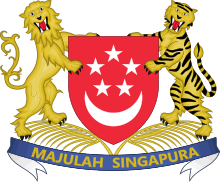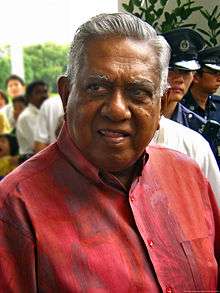2005 Singaporean presidential election
The Singaporean presidential election of 2005 was held to elect the next President of Singapore.
| ||||||||||||||
| ||||||||||||||
| ||||||||||||||
 |
|---|
| This article is part of a series on the politics and government of Singapore |
|
Related topics |
|
|
| Singapore in 2005 | |
| Events | |
| |
| Others | |
| |
After considering the candidate's applications, the Presidential Elections Committee issued one Certificate of Eligibility to the incumbent, S.R. Nathan.[1] Nathan was the only candidate to stand nominated and thus re-electing uncontested on nomination day and was sworn-in for his second term of office on 1 September 2005.
Candidates
21 application forms for the Certificate of Eligibility required to contest were collected, and forms were submitted by four candidates.
The applications were reviewed by the Presidential Elections Committee, which consisted of:
| Candidates | Background |
|---|---|
| Andrew Chew Guan Khuan | Chairman of the Public Service Commission |
| Lim Siong Guan | Chairman of the Accounting and Corporate Regulatory Authority |
| H R Hochstadt | A member of the Presidential Council for Minority Rights. |
The Returning Officer was Tan Boon Huat, the Chief Executive Director of the People's Association.
Eligible
| Candidates | Background | Outcome |
|---|---|---|
| S R Nathan | Seconded to the National Trades Union Congress, and then worked in the Ministry of Foreign Affairs and Ministry of Home Affairs. He was once the Ambassador-at-large of Institute for Defence and Strategic Studies and now the Incumbent President of Singapore. | Application for the Certificate of Eligibility Accepted. |
Declared ineligible
| Candidates | Background | Outcome |
|---|---|---|
| Kuan Yoke Loon Andrew | Kuan was the former chief financial officer of Jurong Town Corporation (JTC). Independent media in Singapore widely speculated that the PAP government was not prepared for Kuan's candidacy,[2] with the Think Centre NGO accusing the state media of "badmouthing" him. He submitted eligibility forms to the Elections Department to issue a certificate of eligibility but was declared ineligible.[3] | Application for the Certificate of Eligibility rejected. |
| Ooi Boon Ewe | Ooi was a real estate executive. His application for the Certificate of Eligibility was rejected by the Presidential Elections Committee due to his lack of experience and ability required by the Constitution. He submitted eligibility forms to the Elections Department to issue a certificate of eligibility but was declared ineligible. [1] | |
| Ramachandran Govindasamy Naidu | His application for the Certificate of Eligibility was rejected by the Presidential Elections Committee due to his lack of experience and ability required by the Constitution. He submitted eligibility forms to the Elections Department to issue a certificate of eligibility but was declared ineligible. [1] |
- On 9 August, Prime Minister Lee Hsien Loong called for all candidates to be open about their records, so that Singaporeans could make an informed judgment on them. He also encouraged Andrew Kuan's former employers to come forward, speak freely and tell Singaporeans what they knew about him.[4]
- On 11 August, Kuan's former employer, JTC called a news conference to provide details on the circumstances leading to Kuan's resignation in July 2004. Chong Lit Cheong, chief executive officer of JTC said that Andrew Kuan's work at JTC had been unsatisfactory since his first year there and he had been asked to resign twice in 2003 and 2004. No details as to how his work was unsatisfactory were provided, other than a note that no fraud or other crime was involved, and he needed "quite a fair bit of hand holding". In reply, Kuan noted that he had worked at JTC Corporation for 37 months, which had extended his contract several times, and he had been given performance bonuses and a raise during this period. Another company, Hyflux, also publicly criticised Kuan.[5]
- Later, Kuan was disqualified by the Presidential Elections Committee for failing to meet the criteria for running for president. The committee said Kuan's seniority and responsibility as JTC's chief financial officer were not comparable to those required by the Constitution. A presidential candidate is required to have had experience as the chairman or CEO of a statutory board, or of a company with a paid-up capital of at least S$100 million.
References
- Press Statement by the Presidential Elections Committee on Applications for Certificates of Eligibility (PDF), Singapore Presidential Elections Committee, 13 August 2005, archived from the original (PDF) on 24 June 2011, retrieved 9 August 2011
- "Archived copy". Archived from the original on 31 October 2007. Retrieved 2008-03-21.CS1 maint: archived copy as title (link)
- http://www.thinkcentre.org/article.cfm?ArticleID=2626
- "PM Lee emphasises importance of electing the right person as President". Channel NewsAsia. Archived from the original on 11 August 2005. Retrieved 28 September 2011.
- "JTC says presidential hopeful Andrew Kuan's work unsatisfactory". Channel NewsAsia. Archived from the original on 14 August 2005. Retrieved 28 September 2011.
External links
- He ran away from home when he was 16 by Zuraidah Ibrahim and Lydia Lim – Ministry of Education.
- Release medical report of S R Nathan
- Government Gazette on Presidential Elections Committee 27 May 2005
